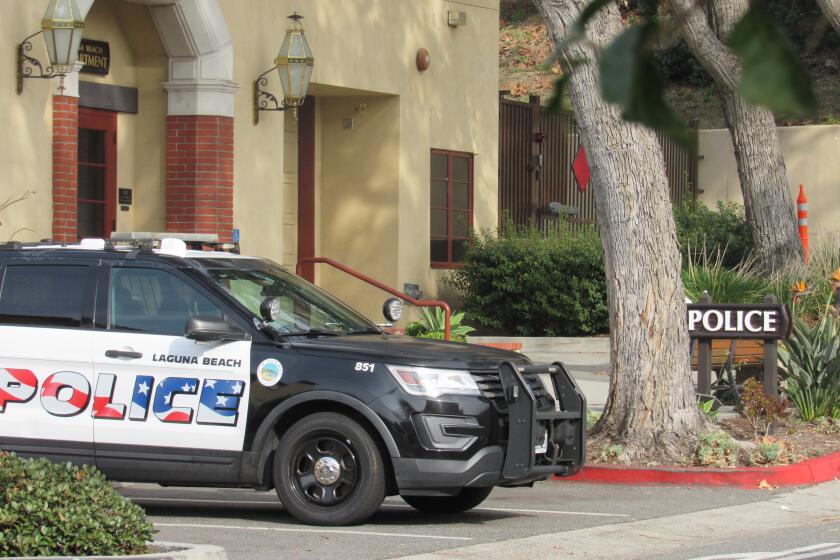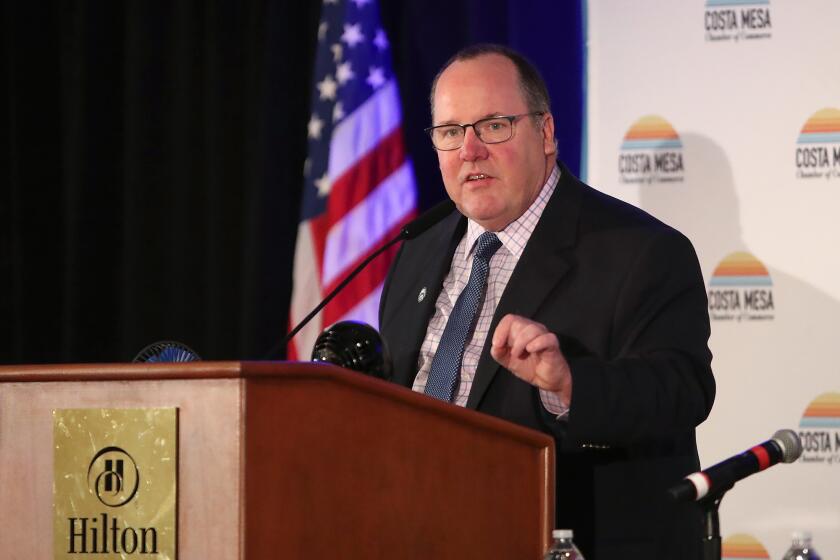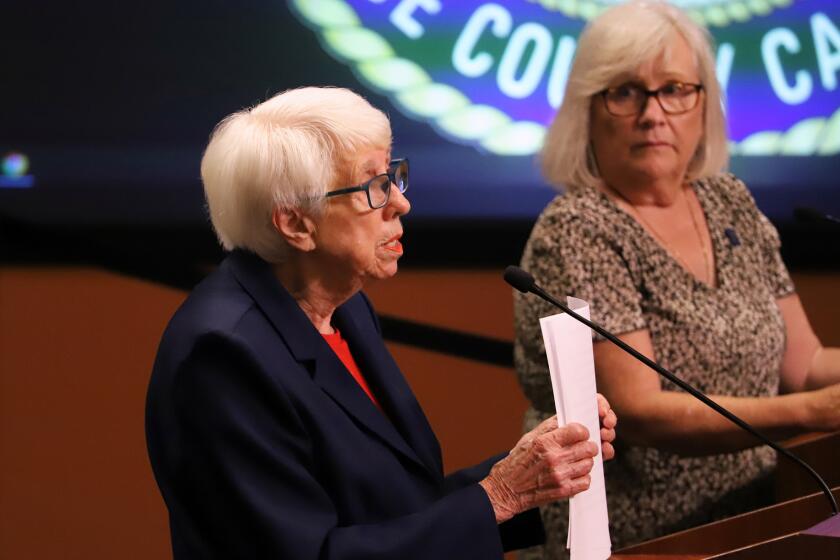Daily inspiration
They called him Bobby then, not Robert, and he was never part of David Kurrasch’s clique growing up.
The boys grew up less than a mile apart in a quiet neighborhood in Santa Ana, and they saw each other often; Kurrasch’s best friend, Eric Christensen, was Bobby’s younger brother. But while the three of them hung out under the same roof, their paths rarely crossed.
Eric and David played with G.I. Joe figures. Bobby didn’t join in.
Eric and David walked or drove themselves to school. Bobby was bused to a special school miles away.
Eric and David were the same age. Bobby was five years older.
“He wasn’t my close friend, but I knew him well,” Kurrasch said. “I would always chat with him when I went over there.”
Four decades later, Kurrasch and Bobby — who now prefers Robert Christensen to his childhood nickname — have a closer bond, one that goes beyond simple friendship.
Kurrasch founded Monkey Hook, a company that manufactures small metal wall hooks, in 2004. Moved by his own experiences with an autistic son, he soon enlisted Elwyn California, a Fountain Valley nonprofit that provides work for developmentally disabled people, to provide an assembly line for his product.
For nearly two years now, Robert Christensen has worked five days a week in Elwyn’s Work Activity Center, sorting through piles of thin, silver Monkey Hooks and fitting them into plastic cases. It’s not just busywork to give him and others something to do — every container of Monkey Hooks, which are sold by retailers nationwide, ships out of that building at 18325 Mt. Baldy Circle.
And even though the two exchanged little more than hellos growing up, Kurrasch knows that he’s an important figure now in Robert’s life.
“Every time I go to Elwyn, he knows when I’m in the building,” Kurrasch said. “He looks forward to our conversations because I make a point to say hello, see what he’s doing, what he’s working on.
“But he has a radar. He knows when I’m there.”
A first paycheck
Robert rises before 8 a.m. five days a week at his assisted-living home in Anaheim, gets a bus ride to Elwyn and takes his seat in a crowded warehouse where plastic casings, unassembled media kits and outdated software — needing to be scrapped — line the long tables.
He wears thick glasses, a necessity since childhood, and uses a walker. As he works, his rehabilitation aide, Michelle Otero, hovers at the end of the table to keep an eye on him and his coworkers. With metal hooks clanking, and paper rustling on the tables around him, he sorts through dozens of Monkey Hooks, using an outline on a sheet of paper to make sure they’re the right shape and stacking three inside each plastic shell.
“When I first started, it was hard for me, because I couldn’t put the hooks in right,” he said. “I had to practice a lot. By Friday, it got better.”
Robert, 58, wishes sometimes that he could do more challenging tasks at Elwyn. But his paid work there is still a first for a man who went more than 50 years without having a job.
The oldest of four children, he was born with Dandy-Walker Syndrome, a congenital disorder in which the tissue that connects the right and left hemispheres of the brain is absent. He also suffers from epilepsy and other birth defects. Until he moved to an assisted-living home a few years ago following his parents’ deaths, he had never left the house where he grew up.
It was through Elwyn, where his siblings brought him last year, that Robert got his first taste of working for a living. And it was through a coincidence that he ended up working for a man who was nearly a family member growing up.
When Eric took a tour of Elwyn, looking for a place where his brother might work, he noticed a pile of Monkey Hook packages and called Kurrasch to ask for his opinion on the nonprofit. Kurrasch encouraged him to bring Robert down, and Eric did so promptly.
Robert started working in a large group at Elwyn, then came under Otero’s supervision when administrators created a new program that reduced the ratio of clients to aides. According to Otero, it took a few months for Robert to master the motor skills necessary to assemble Monkey Hook packages — sometimes putting the hooks in the wrong way, sometimes leaving them dangling outside the shell.
Once he got the hang of it, Otero said, he was a model employee.
“He does very well, and he loves to work,” she said. “Right away, when he comes in and sits down in his seat, he asks, ‘What are we going to do?’”
‘Inspiration every day’
Elwyn, tucked nearly out of sight in a business cul-de-sac in east Fountain Valley, displays its accomplishments proudly. The nonprofit’s lobby features a tall glass case containing a first aid kit, a Revlon gift bag and other products clients have assembled.
More than 100 people work weekdays in Elwyn’s spacious warehouse, where long tables stretch from wall to wall and corporate trucks pull up at the end of the week to carry away another shipment. Not all of the nonprofit’s clients work in-house; others have jobs at supermarkets, veterinary clinics and other businesses.
“It’s a group of people who provide inspiration every day for us,” Joan McKinney, Elwyn’s executive director, said about her clientele.
At Elwyn’s headquarters, though, one product dominates: Monkey Hook, the nonprofit’s biggest customer.
Kurrasch first contacted Elwyn in 2006 when he had a massive order from Ace Hardware. Before long, he abandoned his other providers and sent 100% of his products to the Fountain Valley site for packaging.
“To put disabled people to work when, especially in this economy, they might not have any work is very satisfying to me,” Kurrasch said.
Earning good marks
Elwyn pays clients by the unit, not by the hour — meaning every package of Monkey Hooks or finished media kit nets a few pennies. The nonprofit provides job coaches for new clients and holds group training sessions on days when orders are slow.
In a typical day, Christensen fills dozens of packages of Monkey Hooks. He also earns decent marks from Elwyn, which tracks clients’ progress.
When Christensen started in March 2009, he had 3% productivity, meaning he did 3% as much work as a non-disabled person would do in the same amount of time. Since then, his productivity has gone up to 9%, and staff has set a goal of 3%more.
Elwyn, though, rates clients on more than just productivity in the twice-annual reports it sends to Regional Center of Orange County, a countywide nonprofit that oversees services for people with developmental disabilities. The reports also cover people skills: attendance, attitude, communication and more.
Henry Michaels, the program manager at Elwyn, said Christensen scores high in those categories.
“He’s such a joy to be around,” he said. “We love having him.”
All the latest on Orange County from Orange County.
Get our free TimesOC newsletter.
You may occasionally receive promotional content from the Daily Pilot.



